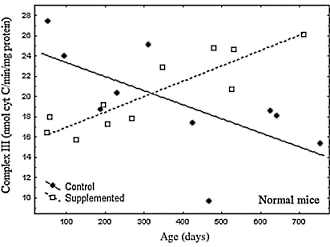|
Definition: "An ergogenic aid is any substance or phenomenon that enhances performance "
|
|
||||||||
05.03.2010 |
|
|
Animal study: a longevity stacker that works
Biologists at the Canadian McMaster University have developed a supplement that retards ageing. The researchers published the results of an animal study in Experimental Biology and Medicine, reporting that the supplement not only extends lifespan, but also has a much stronger positive effect on the quality of life.
Then the researchers made afunctional food from their supplement. They mixed their life-extending ingredients into a dip sauce, dipped pieces of cake into the sauce and fed them daily to their lab animals, for as long as they lived. The dose per kg bodyweight was equivalent to what you would give to humans, but a factor ten higher. That's because a mouse’s metabolic rate is ten times higher than that of humans.
The researchers had already shown in earlier studies that their supplement extended mice's lifespan by 11 percent. Which of course leads to the question about the quality of the extra lifespan. Researchers measure the quality of life of ageing mice by observing their pattern of movement. The more active a mouse is, the better the condition of its muscles, joints, bones and brain cells.

Unt = no supplement; Supp = with supplement.
Both the ordinary and the transgenic mice remained physically active for longer. They showed young behaviour for their whole life.
When the researchers examined the mitochondria in the mice's brain cells, they learned how the supplement works exactly. The mitochondria are the cells' powerhouses. [See mitochondrion above.] Mitochondria convert molecules from food into molecules that provide energy to the cells. This is a stepwise process. As an organism ages mistakes occur more often in the step that scientists call mitochondrial complex III. Superoxides are produced – free radicals that damage cells, and above all mitochondria.
The researchers discovered that their supplement prevented the delicate mitochondrial complex III from being thrown off balance as the mice aged. Apparently antioxidant compounds in the supplement neutralise the superoxides.
"Functional benefits greatly exceeded the modest longevity increases documented for supplemented normal mice", the Canadians write in their abstract. "Regardless, for aging humans maintaining zestful health and performance into later years may provide greater social and economic benefits than simply prolonging lifespan."
The researchers heap praise on their supplement in the article.
"The dietary supplement strongly ameliorated normal functional aging and is likely to benefit age-associated pathologies. Moreover, supplements do not require drastic dieting or induction of states mimicking diapause or dwarfism."
Source:
More:
|
|


